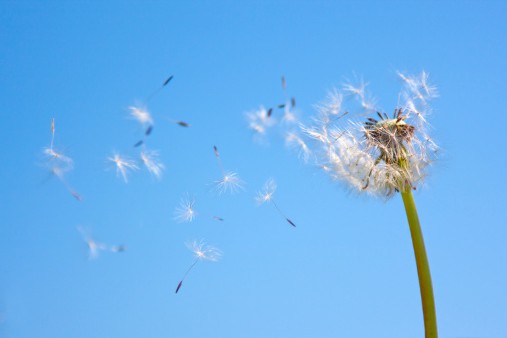Sneezing? Eyes itchy and watery? Allergies gone haywire?
Go ahead and blame winter.
It is indeed in the air, no thanks to the prolonged and precipitation-heavy season that the tri-state area just endured between November and April.
“We think that a lot of it is related to the terrible winter that we had, actually. The term ‘polar vortex’ was all the rage – now people are calling this a ‘pollen vortex,’ “ said Merritt Fajt, M.D., of the University of Pittsburgh Asthma Institute at UPMC and an assistant professor with the Pitt Department of Pulmonary, Allergy and Critical Care Medicine.
 “It was a result of the length of the cold winter and the amount of precipitation that fell. Basically, the roots in a lot of the plants and grass systems are stronger than they’ve been in prior years, so these plants, trees and grasses have been able to pollenate better. The pollen counts lately, in some places, have been two or three times higher than they were in prior spring seasons.”
“It was a result of the length of the cold winter and the amount of precipitation that fell. Basically, the roots in a lot of the plants and grass systems are stronger than they’ve been in prior years, so these plants, trees and grasses have been able to pollenate better. The pollen counts lately, in some places, have been two or three times higher than they were in prior spring seasons.”
Yes, you – or, more specifically, your sinuses and eyes – may have noticed a trend. Last allergy season was no picnic, either.
But Dr. Fajt added that awareness of allergy symptoms and causes, like pollen counts, have been on the rise as well.
“I think in recent years the allergy problems have been considerably more nasty, but people are doing a better job of differentiating allergy symptoms from, say, the common cold,” she said. “So people are more aware of their symptoms and there are a lot of treatments that can make people feel better. As a result, there has been a lot more discussion about allergy suffering and treatments for environmental allergies.”
Allergies know no age limits or geographic boundaries. It is possible for someone to develop one years after moving to a new area . . . or even after never experiencing difficulty previously.
“The traditional thinking previously was that people got allergies when they were younger and either outgrew them or didn’t. But we have been seeing a lot of patients here who actually are developing allergies,” Dr. Fajt said. “Also, we notice that a lot of people will develop allergies when they move to a different part of the country with a different climate. I get a lot of patients who moved to Pittsburgh a few years ago and didn’t have much of a problem before, but since they’ve changed environments they suddenly develop allergy symptoms in the Pittsburgh region.
“Pittsburgh is a hotspot for pollen. Definitely. For example, on a sunny, warm day last week, tree pollen was reading in one of the highest concentrations.”
How do you know if you may be an allergy sufferer?
“One of the things to look for is, if you notice you are experiencing the same symptoms year after year during specific times of year, that’s usually a good indication. If you, every April, start to get sneezy and have itchy eyes, then usually that’s a sign of hay fever or spring allergies,” Dr. Fajt said. “Likewise, a lot of people in the fall when ragweed comes out, they notice they have symptoms. Also, in terms of itchiness in the eyes, usually allergy causes such a symptom in both eyes whereas an infection or a cold could cause just one of the eyes to become uncomfortable.”









